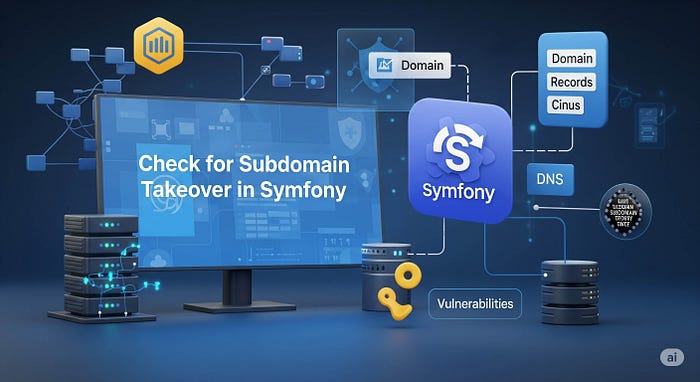Subdomain takeover is a critical security flaw where an attacker claims a dangling subdomain and serves malicious content. This vulnerability can damage your brand's reputation, phish users, or expose sensitive data.
If you're running a Symfony-powered application with multiple subdomains, you must regularly test for subdomain takeover to stay secure.
In this guide, we'll cover: ✅ What is subdomain takeover? ✅ Why Symfony apps are at risk ✅ How to check for subdomain takeover manually & programmatically ✅ How our Website Vulnerability Scanner online helps ✅ Symfony code snippets for better prevention ✅ Additional resources & newsletter
📌 What is Subdomain Takeover?
Subdomain takeover happens when a DNS record (like a CNAME) points to a service (e.g., AWS S3, Azure, Heroku) that's no longer in use, but the DNS still resolves. Attackers can register or claim the orphaned resource and host their own malicious content.
Read more cybersecurity insights on our Pentest Testing blog.
🔍 Why Symfony Apps Are at Risk
Symfony is often used in multi-tenant SaaS platforms where each customer gets their own subdomain. If you delete a tenant but forget to remove its DNS record, it creates an opportunity for takeover.
Example scenario:
- DNS:
customer1.example.com→customer1.s3.amazonaws.com - You delete
customer1bucket but forget the DNS. - Attacker registers
customer1bucket and ownscustomer1.example.com.
🧪 How to Detect Subdomain Takeover in Symfony
1️⃣ Use Our Free Website Security Checker Tool
Our Website Vulnerability Scanner automatically scans for dangling DNS records, misconfigured subdomains, and other vulnerabilities.
➡️ Screenshot of our tool homepage:

➡️ Sample vulnerability report to check Website Vulnerability:

Run your domain now: 🌐 https://free.pentesttesting.com/
2️⃣ Manual Check with Symfony and DNS
You can loop through your subdomain records and check for dangling services with Symfony:
use Symfony\Component\HttpClient\HttpClient;
$subdomains = [
'customer1.example.com',
'customer2.example.com',
];
$client = HttpClient::create();
foreach ($subdomains as $subdomain) {
try {
$response = $client->request('GET', 'http://' . $subdomain);
$statusCode = $response->getStatusCode();
if ($statusCode === 404) {
echo "Possible takeover: $subdomain\n";
} else {
echo "OK: $subdomain ($statusCode)\n";
}
} catch (\Exception $e) {
echo "Error checking $subdomain: {$e->getMessage()}\n";
}
}3️⃣ Symfony Console Command for Regular Scans
Add a Symfony Command to automate checks:
// src/Command/CheckSubdomainsCommand.php
namespace App\Command;
use Symfony\Component\Console\Command\Command;
use Symfony\Component\Console\Input\InputInterface;
use Symfony\Component\Console\Output\OutputInterface;
use Symfony\Component\HttpClient\HttpClient;
class CheckSubdomainsCommand extends Command
{
protected static $defaultName = 'app:check-subdomains';
protected function execute(InputInterface $input, OutputInterface $output): int
{
$client = HttpClient::create();
$subdomains = [
'customer1.example.com',
'customer2.example.com',
];
foreach ($subdomains as $subdomain) {
try {
$response = $client->request('GET', 'http://' . $subdomain);
$statusCode = $response->getStatusCode();
if ($statusCode === 404) {
$output->writeln("<error>Possible takeover: $subdomain</error>");
} else {
$output->writeln("<info>OK: $subdomain ($statusCode)</info>");
}
} catch (\Exception $e) {
$output->writeln("<comment>Error checking $subdomain: {$e->getMessage()}</comment>");
}
}
return Command::SUCCESS;
}
}Run with:
php bin/console app:check-subdomains🛡️ Preventive Tips
✅ Remove unused DNS records when deleting tenants.
✅ Regularly scan DNS zones for orphaned CNAME/A records.
✅ Use NXDOMAIN and 410 HTTP responses for deleted subdomains.
📈 Explore Our Related Services
🔗 Web Application Penetration Testing
For a deep-dive professional assessment of your web apps, including subdomain takeover tests, check our Web App Penetration Testing Services.
🤝 Offer Cybersecurity Services to Your Clients
If you're an agency or MSP, you can white-label or resell our cybersecurity expertise to your clients. Details here: ➡️ Offer Cybersecurity Services
📬 Stay Updated
We regularly publish guides and insights like this on Medium and LinkedIn. 👉 Subscribe to our newsletter: Subscribe on LinkedIn
Final Words
By proactively checking for subdomain takeover in your Symfony applications, you protect your customers and your brand from avoidable risks. Automate these checks with Symfony commands and complement your efforts with tools like our free scanner.
Have questions? Drop them in the comments, or connect with us on LinkedIn.
Happy secure coding!


